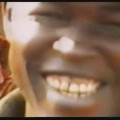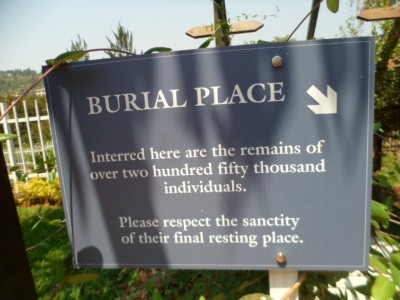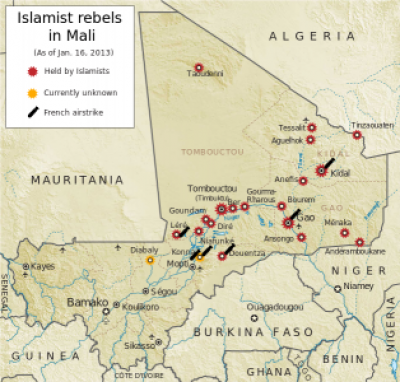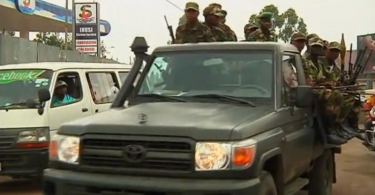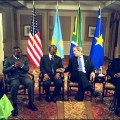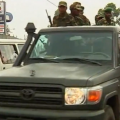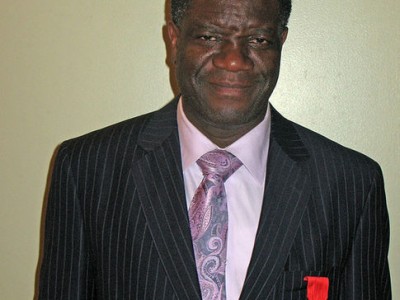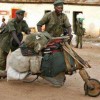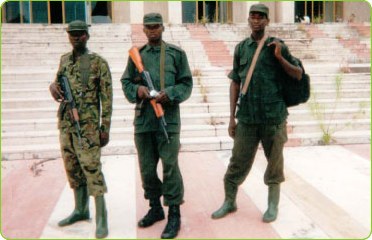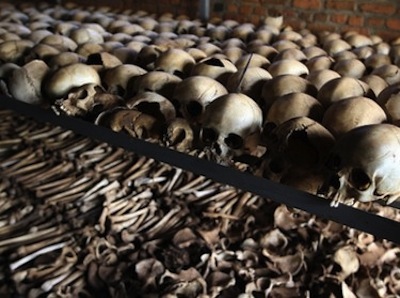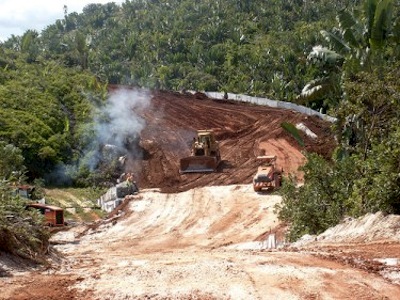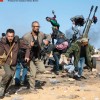Stories about Rwanda
Paying Tribute to Captain Mbaye Diagne, The Senegalese Hero of Rwanda
At the time of writing, June 2013, official commemoration of victims of the 1994 Rwandan genocide is continuing around the world. But few people still remember Captain Mbaye Diagne. However, this young officer from the Senegalese army showed bravery at a time when the rest of the world was demonstrating cowardice. Enrico Muratore has been fighting for years to ensure that the name of this hero is not forgotten.
Rwanda: NGO's Pursuit for Justice against Perpetrators of Genocide
Rwanda remembered the start of the genocide on April 7, as they have done every year since 1994. In the 19 years following the genocide, the hunt for the perpetrators of crimes against humanity has never ceased. In France, the Collective of Civil Plaintiffs for Rwanda (CPCR) is one of the organisations that fight against impunity. Its Chairman, Alain Gauthier, answered some questions by Global Voices author Abdoulaye Bah:
African Presidents Active on Social Media
Dapa Arnaud gives a list of the 10 most active african presidents [fr] on social media. At the top of the list is president Paul Kagame in Rwanda: In place since 2003, the president of Rwanda is the most active on the internet. According to the Ecofin agency, Paul Kagame interacts...
Gabon to Mali: History of French Military Interventions in Africa
The French military intervention in Mali, known as Operation Serval started on January 11 following the advance of terrorists groups towards Bamako. Lauded by a substantial part of the Malian population and many outside observers, the military intervention diverts, however, from the non-interventionist line professed by French President Hollande in Africa.
The Elusive Quest for Peace with the M23 in the DRC
The current conflict in the Kivu Region of the Democratic Republic of Congo (DRC) threatens to linger on despite an international effort to broker a truce between the M23 rebellion and the Congolese government. The conflict is difficult to grasp, because the M23 rebellion has been a shifting movement, both geographically and politically.
Increasing Risks of Humanitarian Disaster in Masisi Territory of DR of Congo
Much suggests Masisi territory being the neuralgic point, both in terms of politico-military contest and its humanitarian consequences.Any extension of the M23 conflict farther into Masisi territory contains immense potential of escalation. Christophe Ethuin reports that there is much reason for concerns in Masisi Territory as the conflict with M23...
A Timeline of 50 Years of Conflict in the D.R. of Congo
The ongoing conflict between M23 rebels and the Congolese army cannot be totally understood without some historical background on the genesis of these conflicts in the great lakes region. Here is a detailed chronology of the last 50 years of confrontations in this region.
Mapping the Conflicts in DRC in 2012
The Crisis Group has created an interactive map of the conflicts in the Kivu region, DRC in 2012 [fr].
Have M23 Rebels Really Left Goma, DRC?
Backed by the Rwandan government, M23 rebels seized control of the city of Goma in the Kivu region, near the Rwandan border. Despite reports that the rebellion have agreed to pull out of Goma, it seems that there is still a great deal of uncertainty over when they will effectively do so.
D. R. of Congo: Human Rights Activist Assaulted, Guard Killed
Leading Human Rights Activist and gynecologist Denis Mukwege, was attacked outside his home, and his guard killed on October 25, 2012. Doctor Mukwege has campaigned tirelessly for the wellbeing of women and girls affected by the use of mass rape as a weapon of war. He recently gave a speech to the United Nations where he spoke of his outrage and shock at the violence that females have suffered in his homeland.
Africa: Mountain Gorilla Conservation Data
Over 5,000 days of Mountain Gorilla conservation data in Rwanda, Uganda and the Democratic Republic of Congo: Fifteen years ago, ranger-based monitoring (or RBM for short) was initiated as a tool in the conservation of mountain gorillas. Whether patrolling the park for law enforcement or tracking mountain gorillas for health...
DR of Congo: Rwanda is Helping the Rebellion, says Human Rights Watch
Human Rights Watch wrote [fr]: In addition to deploying reinforcements and recruits to support military operations, Rwandan military officials have been providing important military support to the M23 rebels, including weapons, ammunition, and training, Human Rights Watch said. This makes Rwanda a party to the conflict.”
Africa: Children Film Education and Jobs
Our Africa is a project which lets children across Africa film education and jobs in their countries the way they see them.
D. R. of Congo: M23 Rebels Take Their Offensive Online
The M23 movement has made headlines by entering into open conflict with the Congolese army. But the rebel group is not stopping at armed conflicts on the ground - they have also gone on the offensive on the Internet and social networks.
Democratic Republic of Congo: Rwanda Accused in North Kivu Violence
Since April 2012, North Kivu province in the eastern Congo has been destabilised by the March 23 movement (M23), comprised of fighters from the Tutsi-led National Congress for the Defence of the People (CNDP). M23 continues to cause enormous loss of life and massive population displacement within the province.
DR of Congo: Does Rebel Group M23 Seek Kivu Secession with Rwanda's Approval?
Giles Muhane reports that the March 23 Movement M23 rebel military group is believed to be seeking secession of the the province of Kivu from the Democratic Republic of Congo. Muhane adds that Kinshasa authorities have publicly accused Kigali of supporting a mutiny in Congo. Rwandan President Paul Kagame denied any involvement in the Congo...
Rwanda: From Colonialism And Genocide to Recovery
1 July was a very special day in Rwanda as the country celebrated 50 years of Independence and 18 years of liberation which brought an end to Rwandan genocide. It is estimated that over a million people died in a period of 100 days.
The Evolution of African Social Welfare Systems
The implementation of national social welfare systems is still in its evolutionary phase for many African countries. The achievement of the systems currently in place are discussed by social protection experts in Sub-Saharan Africa.
Africa: Calls for Transparency Over Marked Increase in Land Deals
Almost 5% of Africa's agricultural land has been bought or leased by investors since 2000. Observers are increasingly worried about the fact that such land deals usually take place in the world poorest countries and how they impact its most vulnerable population, the farmers.
Africa: Interview With Africa Desk Officer at the Committee to Protect Journalists
Abdoulaye Bah interviews Mohamed Keita who runs the Africa desk of the Committee to Protect Journalists, an independent, nonprofit organization founded in 1981 to promote press freedom worldwide by defending the rights of journalists to report without fear of reprisal.

